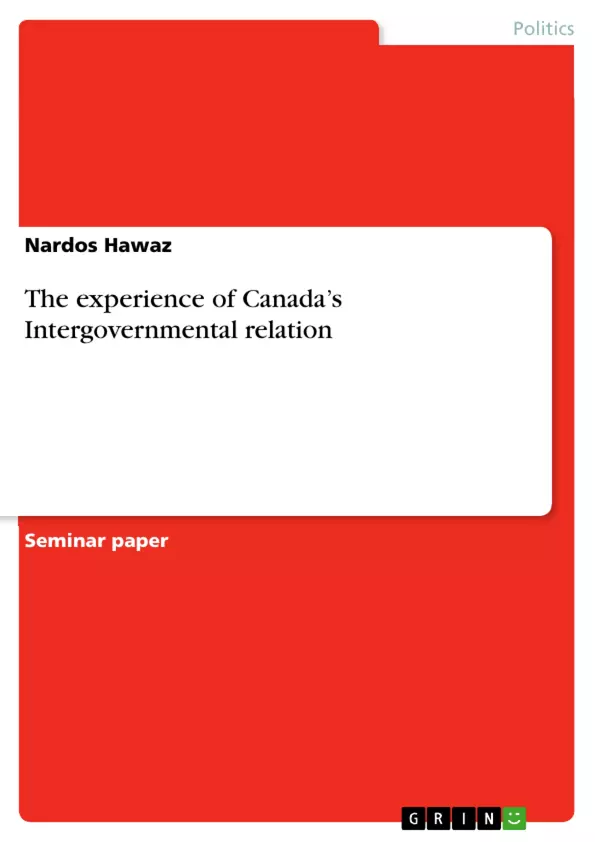Federal countries will enjoy two or three levels of government that the government can recognize and acknowledge through constitution. Many provisions may given constitutional recognition and some issues may not include in the constitution. The councils of the unconstitutional cases shall be implemented in the hands of the council through proclamation.
As a country's successful transboundary, the federal government, which can be registered in various sectors, is based on the healthy inter-governmental relationship between federal and the regional governments as well as among regional government. Either IGR own constitutional recognition or not, its presence is mandatory if not, it puts a black spot and effect the growth of the country.
Some countries report that the relationship is not effective, and for the newer federal states seek the experience of the effective experience. In this regard, Canada has many experiences that it can share with other countries.
This paper shows the effectiveness of Canadas experience on IGR. The role of politicians, the federal government, and constitution will be illustrated. The community's interest in giving response to the IGR will be reviewed.
Inhaltsverzeichnis (Table of Contents)
- Overview of Canadian federalism
- The constitution and forms of government of Canada in IGR...
- Overview of Intergovernmental relation in Canada
- Party politics and party politicians in intergovernmental relations
- Formal vs informal institution in Canada
Zielsetzung und Themenschwerpunkte (Objectives and Key Themes)
This text explores the evolution and dynamics of intergovernmental relations (IGR) in Canada. It delves into the historical context, constitutional framework, and key institutions shaping the interaction between the federal and provincial governments.
- The historical development of Canadian federalism
- The role of the Constitution in defining IGR
- The influence of political parties and institutions on IGR
- The importance of diversity and its impact on IGR
- The economic dimensions and implications of IGR
Zusammenfassung der Kapitel (Chapter Summaries)
- Overview of Canadian federalism: This chapter introduces the structure of Canadian federalism, highlighting the division of powers between the federal and provincial governments. It discusses the unique characteristics of Canadian federalism, including the provinces' autonomy and the role of equalization payments.
- The constitution and forms of government of Canada in IGR...: This chapter examines the constitutional framework of Canada, focusing on the parliamentary system and the role of the monarchy. It discusses the power dynamics between the executive, legislative, and judicial branches.
- Overview of Intergovernmental relation in Canada: This chapter explores the development and evolution of IGR in Canada. It examines the origins of the concept and its relevance in the context of fiscal arrangements and public policy.
- Accommodation of diversity and IGR in Canada: This chapter discusses the significance of diversity in Canadian society and its impact on IGR. It explores the historical context of diversity, including the role of treaties and legislation in mediating relations between different groups.
- Party politics and party politicians in intergovernmental relations: This chapter examines the role of political parties and politicians in shaping IGR. It analyzes the influence of party platforms, ideologies, and strategic considerations on the dynamics of intergovernmental relations.
- Formal vs informal institution in Canada: This chapter delves into the formal and informal institutions that govern IGR in Canada. It discusses the strengths and weaknesses of both formal institutions, such as the Senate, and informal mechanisms of interaction between governments.
Schlüsselwörter (Keywords)
The main keywords and focus topics of this text include Canadian federalism, intergovernmental relations, constitutional framework, division of powers, party politics, institutions, diversity, fiscal federalism, public policy, and economic growth. These terms reflect the core concepts and themes explored in the work, offering insights into the complexities and dynamics of governing a diverse and geographically expansive country like Canada.
Frequently Asked Questions
What is the basis of Canadian federalism?
Canadian federalism is based on a division of powers between the federal and provincial governments, recognized through the Constitution, allowing for regional autonomy.
Why are intergovernmental relations (IGR) important in a federal state?
IGR is mandatory for the growth of the country as it ensures healthy coordination between different levels of government in sectors like economy and public policy.
What is the difference between formal and informal institutions in Canada?
Formal institutions include the Senate and constitutional provisions, while informal institutions refer to mechanisms of interaction and negotiation between politicians that are not strictly defined by law.
How does Canada accommodate social diversity through IGR?
Canada uses its federal structure and intergovernmental negotiations to mediate between different cultural and regional groups, ensuring their interests are represented in the national policy.
What role do political parties play in intergovernmental relations?
Party politics and ideologies heavily influence how federal and provincial governments interact, often shaping the dynamics of fiscal arrangements and power-sharing.
- Citation du texte
- Nardos Hawaz (Auteur), 2016, The experience of Canada’s Intergovernmental relation, Munich, GRIN Verlag, https://www.grin.com/document/378382



